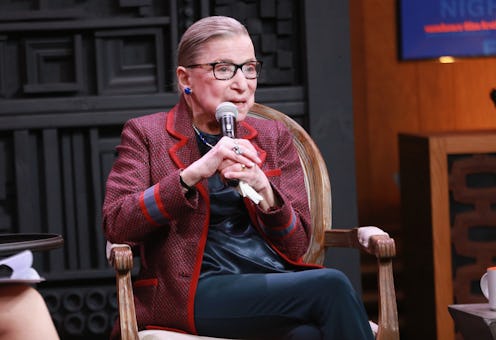News
Ruth Bader Ginsburg Speaks Out On #MeToo & Everyone Is Like *Praise Hands*

The oldest woman on the Supreme Court has been around for long enough to know firsthand the struggles that women in the United States have fought to overcome over the years, no matter what profession they're in. During an interview at the Sundance Film Festival on Sunday, Ruth Bader Ginsburg spoke about the #MeToo movement, and expressed hope that laws and attitudes surrounding sexual harassment in the U.S. have finally begun to change.
"Every woman of my vintage knows what sexual harassment is, although we didn't have a name for it," the 84-year-old Supreme Court Justice told NPR's Nina Totenberg during an appearance at Sundance. "The attitude towards sexual harassment was simply, 'get past it. Boys will be boys.'"
Starting with reports of sexual misconduct that led to the downfall of Hollywood producer Harvey Weinstein in October, individuals across a variety industries started coming forward about harassment and assault, sharing their stories with the hashtag #MeToo. Since then, these allegations have led the the ousting of powerful figures such as Matt Lauer, Sen. Al Franken, and Charlie Rose.
Ginsburg had a simple response when asked about this shift in the discussion surrounding sexual misconduct: "It's about time."
For so long women were silent thinking there was nothing you could do about it. But now the law is on the side of women or men who encounter harassment and that's a good thing.
The justice added that she was confident that seeing women represented in higher numbers across various industries would help to change the current culture, and lessen potential backlash against the #MeToo movement.
"When I see women appearing every place in numbers I'm less worried about backlash than I might have been 20 years ago," she said.
Ginsburg has recognized gender-based discrimination throughout her career, and she has fought for legislation to close the gap between men and women in the workplace. When she was a professor at Rutgers University, she joined her fellow female faculty to fight for equal pay when she discovered that her salary was lower than that of her male colleagues. She later handled sex discrimination complaints on behalf of the ACLU's New Jersey affiliate.
On Sunday, the Supreme Court justice even shared her own personal story of experiencing sexual harassment when she was a student at Cornell University. She told Totenberg that an instructor gave her the answers to a test, presumably expecting sexual favors in return. She confronted the instructor about the matter, and purposefully answered two questions wrong thereafter.
The "Notorious R.B.G.," as she's affectionately called, is only the second woman in history to serve on the Supreme Court, and law still remains one of the least diverse professions in the country. Even with three women currently sitting on the Supreme Court, sexism still plays out in a number of different ways.
A study published by the Harvard Business Review last year found that female justices are consistently interrupted more than their male counterparts. Over the last 12 years, 32 percent of the interruptions tracked were of the female justices, while only 4 percent were made by the female justices.
This pattern is just one example of how sexism plays out within one of the highest branches of government — one whose votes can have a tremendous impact on the lives of women for decades, as is the case with decisions such as Roe v. Wade.
Perhaps this is why Ginsburg didn't hesitate to answer when asked, back in 2015, at what point here would be enough women serving on the Supreme Court. The sharp justice didn't skip a beat: "When there are nine."